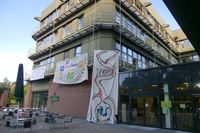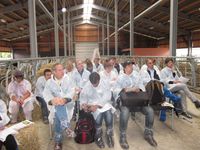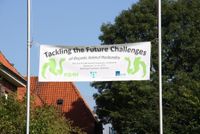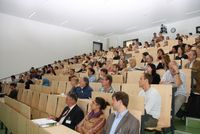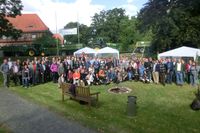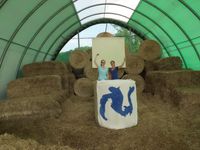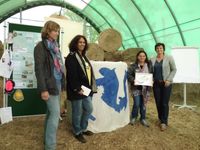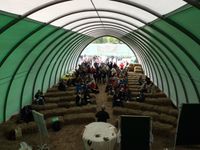2nd International Organic Animal Husbandry Conference in September 2012 in Hamburg, Germany
Organic animal husbandry still needs a lot of scientific support
Organic farming is based on the idea of an environmentally-friendly food production system with high animal welfare standards. Nevertheless, reality shows many problems in reaching these goals. There are many problems in animal health and welfare that remain unresolved and present a challenge for individual producers and the industry as a whole. These include: achieving balanced, 100%-organic, feed rations that produce adequate growth rates and high product quality, animal- friendly transport and slaughtering, sustainable use of local resources and, last but not least, profitability and efficient use of resources.
Beside these internal issues organic farming is increasingly being asked to give answers to the main challenges facing humanity: food security and safety for an ever-increasing world population, cli- mate change, increasing pressure on non-renewable resources (energy and crude fertilizer like rock phosphate), losses in agricultural and natural biodiversity and last but not least development of rural areas.
Organic Animal Husbandry does not always fulfill its promises
Animal welfare is a central objective of organic farming and one of the most important reasons why consumers purchase organic products. In 1980 IFOAM set out its objective of “providing farm ani- mals with living conditions based on animal welfare and an ethical basis” This subsequently be- came incorporated into the European organic farming standards (as defined in 834/2007/EC). The reality, however, often differs from this aim.
-
Hybrid poultry - bred for cages and intensive keeping – are kept on organic farms and often show severe difficulties in behaviour (including feather pecking and cannibalism) and health problems. Male chicks from laying hen populations are still killed instead of fattened. No farm- reared breeds of poultry or double purpose breeds are used because they do not fulfil the performance and production requirements of farmers. Poultry is still kept in large flocks, with several thousand animals in one barn.
-
In pig production, the castration of piglets is an unsolved problem. Conventional pig production has forced the abolition of castration but this is causing problems in organic pig farming as it has an impact on farming practice (i.e. the keeping, feeding and housing of boars), the environment (i.e., the climatic impact of anaesthesia), profitability (i.e. production cost advantages, marketing sacrifices) and meat quality (i.e. odour, tenderness, juiciness, low intramuscular fat content). Another problem in this sector is the mortality rate of piglets, which is higher in organic than in conventional systems.
-
Last but not least the organic dairy sector also experiences problems. The removal of horns from beef cattle is still widely practiced on organic farms. The life expectancy of organic dairy cows is no higher than in conventional dairy systems and the use of animal medications is not significantly less (although more natural medications are used). The tethering of cows is still permitted on small organic farms (with less than 35 cows) and is widely practiced. Milk production is still heavily reliant on the use of cereals, the organic ration can contain up to 40% concentrates: 50% in the high lactation phase and in practice even more.
Feeding livestock is one of the most difficult problems. As a consequence of the BSE crisis, omnivores, such as pigs and poultry, have been turned into „vegetarians/vegans“ yet are still expected to maintain rapid daily weight gains (and therefore need a high level feed quality to ensure sufficient essential amino acids in the diet).
While conventional animal husbandry permits the use of synthetic essential amino acids, these are not allowed in organic agriculture. But plant based organic feeds have not closed this protein gap for fast-growing young animals like piglets and broilers as well as high yield animals like sows and laying hens. The “vegan” diets for these animals does not contain sufficient essential amino acids. However from the start of 2012, 100% organic feeding will be required by law in the EU, although the problem of how to close this gap has not yet been solved.
In can be concluded from the numerous status quo analysis in the last decade (mainly in Europe), that on many organic farms animal husbandry is unsatisfactory in terms of both animal welfare and production yields. This creates both an economic and an image risk.
How can science help?
Scientific support of organic husbandry has already achieved much in the past ten years. Animal research is a long and complex business. The organic animal husbandry research agenda should focus on the following issues
-
Reducing the negative environmental impacts (CO2 emissions, dust, smells, nitrates) from organic animal husbandry.
-
Increasing the efficiency of the use of on-farm and local resources.
-
Improving animal health and longevity
-
Increasing product quality and production output per animal.
-
Guaranteeing and securing competivenes on global markets.
The 2nd International Conference on Organic Animal Husbandry, held in September 2012 in Hamburg and Trenthorst (Germany) and organized by IFOAM, ISOFAR, Thuenen-Institut, and Senat Ressortforschung, is the following up of the 1st Conference in 2006 in St. Pauls (USA). This conference has discussed the future challenges of Organic Animal Husbandry and made suggestions for future development of a sustainable, profitable and animal friendly organic production of livestock products. This is a challenge. Solutions can only be found in an interdisciplinary system approach, together with scientists, farmers and consumers.
